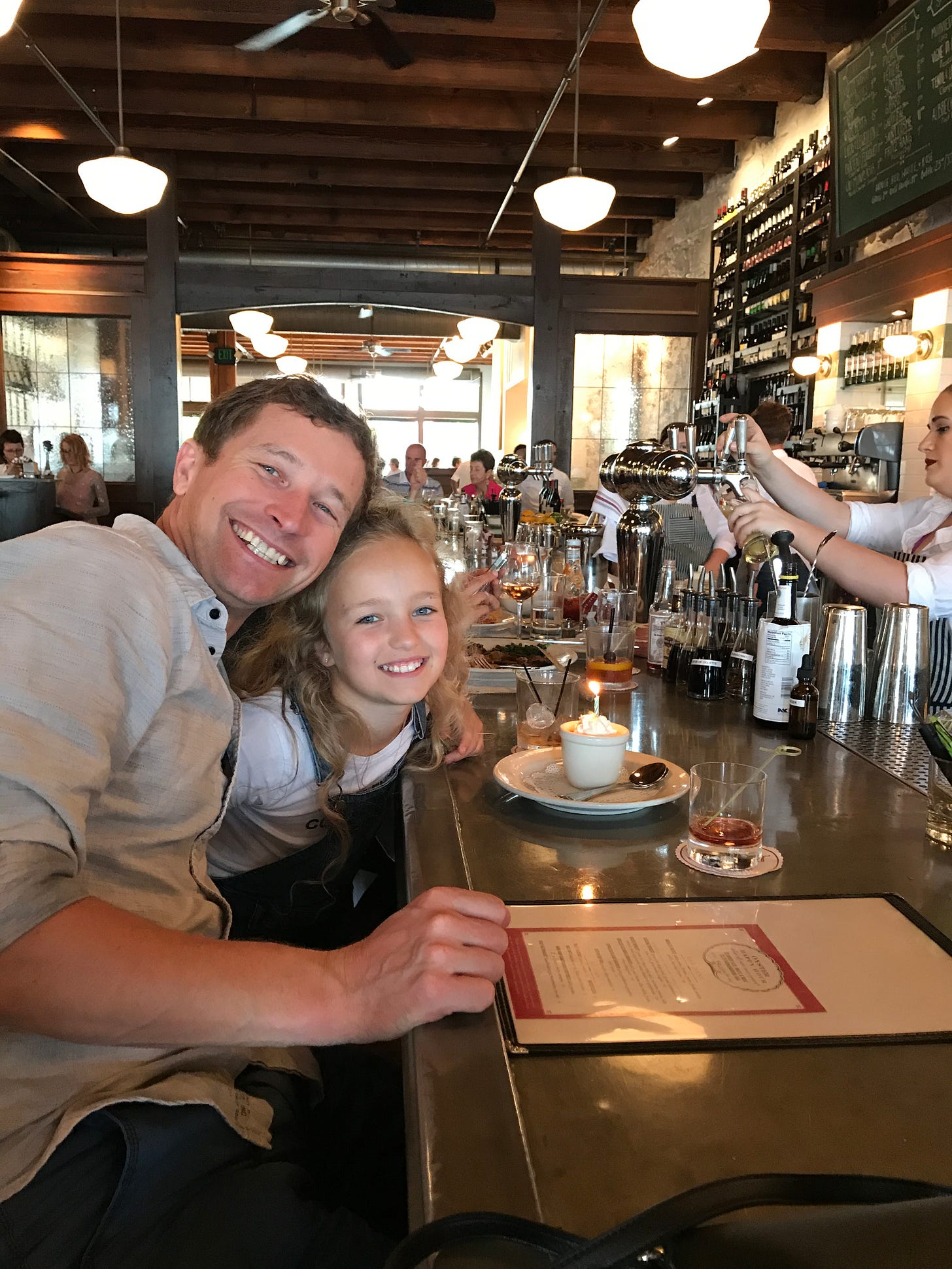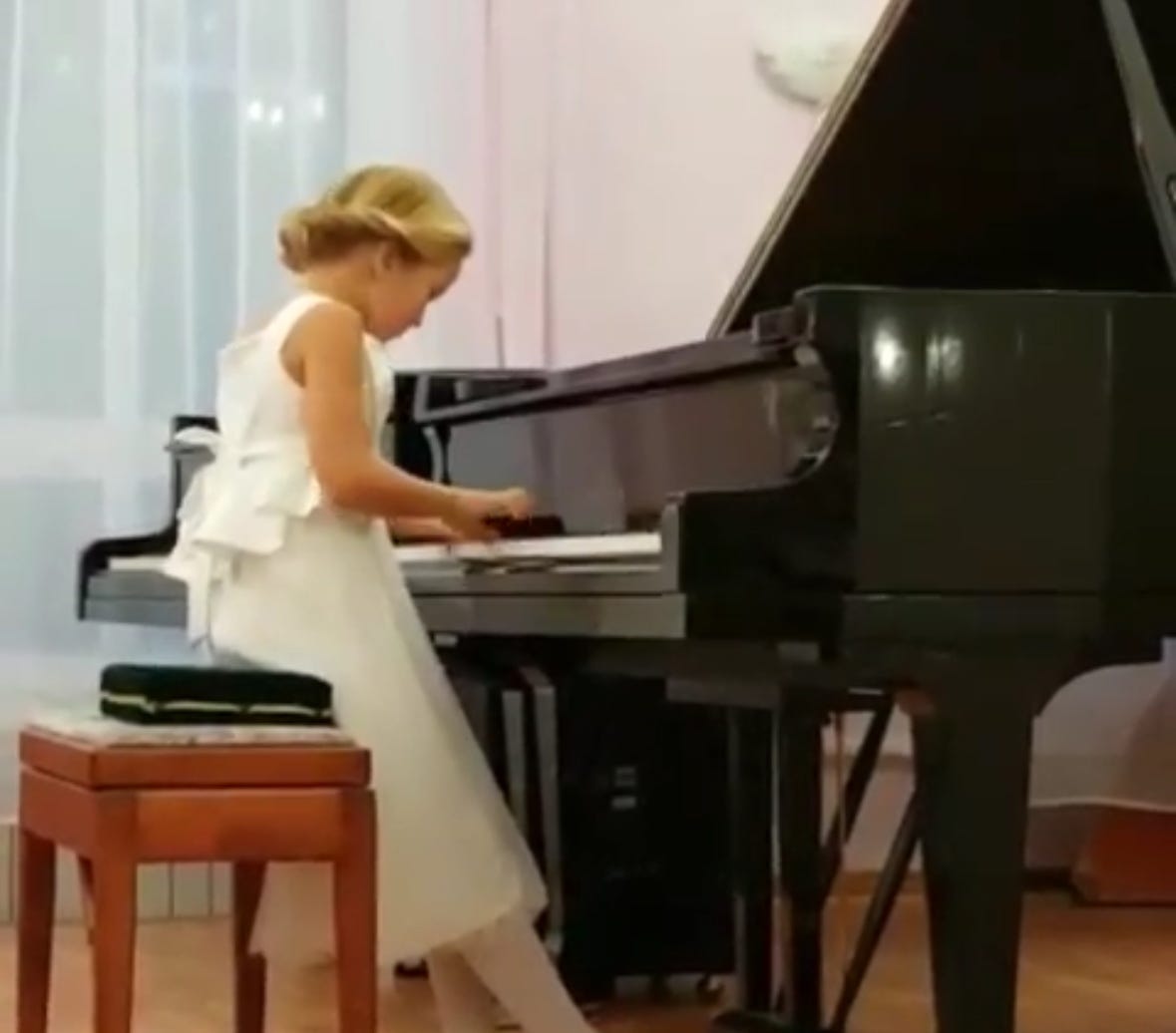Shaping Dreams of a Piano Prodigy
Essay. A madman crushes dreams and ends my summers with my niece.
I hear Chopin. I shut the outside door and the noise of the street, then stand in the middle of my living room, as quiet as I can be. The smooth piano arpeggios roam the house. I listen. The precision of timing, the swing of emotion, the power of held pauses, the dynamic range of crescendos. She is almost ready for her concert.
Kristina is playing upstairs. She cannot hear me, even if I move, but I am afraid to offer her an excuse to stop playing early. I slowly creep upstairs, tip-toe through the narrow corridor over the creaky planks, and peek into the room. Her tiny back is to me, hands on the piano, her head shifts left to right with the flow of the notes on the sheet. She is on the last movement, with only a few bars left, then the coda.
She misses. Her small ten-year-old hands can only touch the edges of keys across an octave. Yet, somehow, almost always, she lands the thumb on the middle C and the edge of her pinky on the C an octave lower. My hand is twice the size, and it is still a stretch. She tries again, then again, then again. Three times, it is perfect.
She sees my reflection in her phone, propped up by the notes, and turns.
“Egor!” she scolds me and puts the music away.
“Don’t you still have Bach to play?” I ask.
“No, I started with Bach,” she says with a straight face.
I am suspicious, but I don’t press. I am only an uncle. It is not my job to enforce parents’ dreams.
“I am hungry. Can we go out and have that tuna sandwich?” she implores.
I know what she means.
We sit at the bar. She loves doing such adult things, and I am happy kids are allowed at the bar at Weary Traveler. Chris, the proprietor, sees us and heads over our way.
“Kristina!” he says. “ Back from Russia for the summer?”
She nods. She understands minimal English, whatever she picked up last summer, and whatever she learned in her Russian school.
“Back to study the piano?” he asks. She nods. “You should have told me you played last year. Are you ten? Yes. I hear you are very good. Very good!”
She waits for me to translate, then screws up her face as if she heard the most ridiculous thing. She was only third in her last competition in Spain, she reminds me. I remind her the other kids were thirteen. She scoffs.
“Do you want to be a concert pianist?” Chris gives her a Shirley Temple, three cherries on a stick in a fancy glass.
She thinks, shrugs, shakes her head. “Designer.”
“Would she?” Chris speaks to me. “Could be hard to sidestep such talent.”
I don’t know. I know what everyone else wants. And I know she wants to be a kid and to be left alone. I take her side. I don’t insist on the two-hour practice sessions her family expects, so we collude, turn an hour into two in our reports, then use the rescued time to ride bikes, hunt for ice cream, and listen to free rock concerts in the parks.
At home, she asks why everyone asks the same. Her face shifts into a mocking mask of self-importance, and her voice lowers an octave, “Will you be a concert pianist?” she waddles like a penguin as she talks. Talent is rare, I try to explain. People hope that kids succeed and grow to be their best versions. But she does not see what that has to do with the piano. She lies down by the dog and kisses its black snout, pulls on his legs, pets his chest and belly, speaks to him in baby talk.
The next day, we ride our bikes up the downtown hill, circle the ornate State Capitol. She huffs with the pretend effort and complains that we did not go the flat way. But she likes the glide down the gentle descent of State Street towards Bascom Hill and the sprawling University of Wisconsin campus. Our aim is the 1960s brutalist monolith, housing the Humanities and the School of Music. It is stark concrete and glass, abrupt and vulgar, so at odds with the refinement of the classical arts practiced inside.
We park our bikes and dash to the door. We are late. Kristina navigates the maze and the stairs ahead of me. She spent the last summer here, at the grand pianos of the practice halls.
Kan-Woo is waiting. He is a punctual man, but he forgives her lateness. The slight Korean is kind to those who ply his art and share the bond with classical masters.
They play Chopin, stop, and start, adjusting the nuance of the sound and the mood. I don’t know what they do to notes nor why, but I hear the growing beauty in the sound. They have their own language of words and gestures to agree on the loudness of the crescendo or the slowness of the ritardando. I seldom need to translate.
They switch to Bach. She plays it through — great, I think, but Kan-Woo shakes his head.
“Tell her,” he speaks to me, “ her technical playing is wonderful, but this piece needs more expression. It sounds dead. It needs more heart.”
He talks of Bach’s ideas, the two voices in the piece, and their interplay of coy advances. She listens but does not understand. He plays a section once with a mechanical precision and then again with the emotion flowing from his finger movements into the expressive power of slightly lengthened notes.
“Do you hear it?” he asks her. She nods and tries, but there is little change, maybe a single note of feeling. The following week, it is a musical bar. In two months, Bach is breathing life, the piece beats with a heart, and the grand piano grows a soul.
Next summer, she returns and plays Khachaturian. Rachmaninov is the year after that. The next year, it is Grieg. They watch a video of her in front of the organ pipes, the cellos, and the violins of the full orchestra. She is in a long black gown, leaning into solos on the grand piano just to the right of the tuxedo-tailed conductor. Kan-Woo nods his head. “Beautiful. Beautiful!” he says, “ I know what we need to fix.” Their bond grows with the complexity of the pieces.
Our bond grows with each summer month. She is thirteen and has a boyfriend now back at her school, a hockey player like her dad. They text and chat in the early morning and late at night, speaking across the twelve-hour time difference on the opposite sides of day and night. She tells me he is nice but young and immature. He is almost two years older, but he is still a boy, she says, so she has to be patient with his silliness.
I almost laugh. But she does not mean it as a joke, so I keep a straight face and nod. Later, I scold myself for the arrogance of finding her thoughts on young men amusing. Do I know more because I repeated mistakes for thirty years longer? She lived a lifetime if lifetimes were measured by achievement.
In the summer months, we are inseparable. Kristina tags along to my friends’ birthday parties, backyard grill-outs, post-concert parties at the symphony, or picnics on blankets at summer festivals. Everyone wants to talk to her about piano. She wants to talk about design, Katy Perry, and a teen movie star whom she met on one of our trips to California.
Some weekends, she demands a break. We load the car with paddle boards, food, and ginger beer, my girlfriend and our dog, then drive to the river. We paddle to our island. It is a sandbar, birds, and no one else. We throw a frisbee. We toss sticks to the dog. We run from the shallows into the sudden deeper holes to film the faces turning silly when the invisible bottom falls away, and the body lurches forward in a momentary free fall. We drink ginger beer. We talk about Katy Perry, whoever she is.
After she leaves for home in Russia in August, my sister sends welcome news. Kristina won a competition, a big one this time, and she will play at Carnegie Hall in New York next summer. Soon, we receive a poster with a date and a program, and we all make plans.
Then it all stops.
A madman marches his army across the Ukrainian border to start a vicious war. He wastes lives, and he kills dreams.
There is no visa for her next summer. There is no performance. There is no visit.
I watch her life unfold through a five-inch Instagram window on my phone. The window is too narrow for authenticity, only wide enough for a selection of half-truths curated for unknown followers. Her posts are focused on fashion and design. They are growing in sophistication, and she gets hundreds of likes.
I like them too. But I don’t understand what they are for. Expression? Validation? But I fail to imagine how an ephemeral, inattentive tap on a drawn heart can match the power of human attention in a filled concert hall. She has both. Would she not know?
I want to convey my lament on our WhatsApp chats, but I am only an uncle, just one pillar of support. I hold my cutting tongue I sharpened for the influencers and paddlers of minor thought. I have no right to shape her dreams. Instead, I choose to believe that whatever she does, she will make meaningful.
And I hold onto my own dream. When she grudgingly tells me about the going-ons at her musical conservatory, I grin and smile brighter, and show my happiness with abandon. She plays. Still plays. And I dream of Grieg, given life with her emotion, playing to the sold-out crowd at Carnegie Hall.





